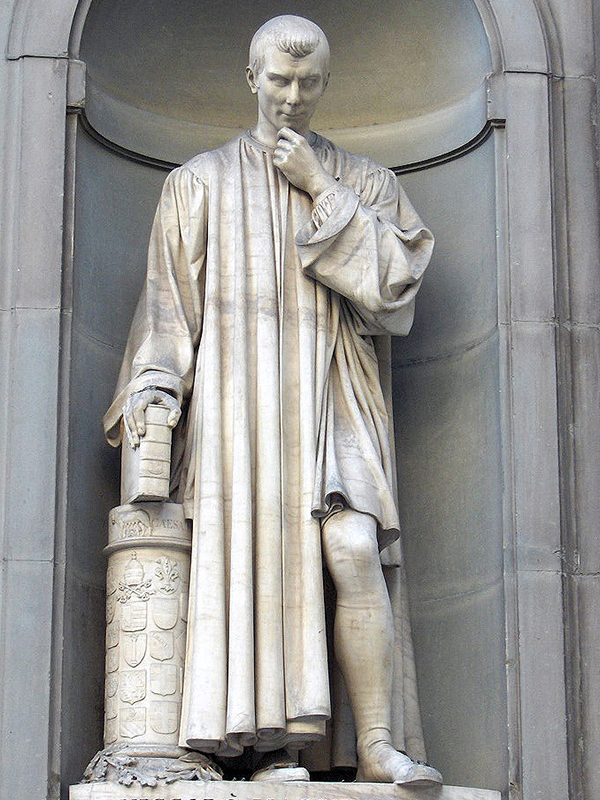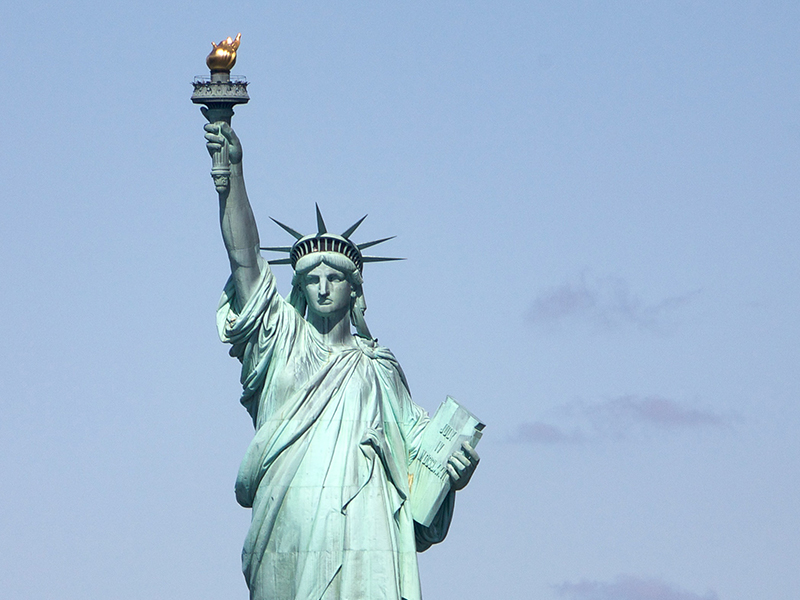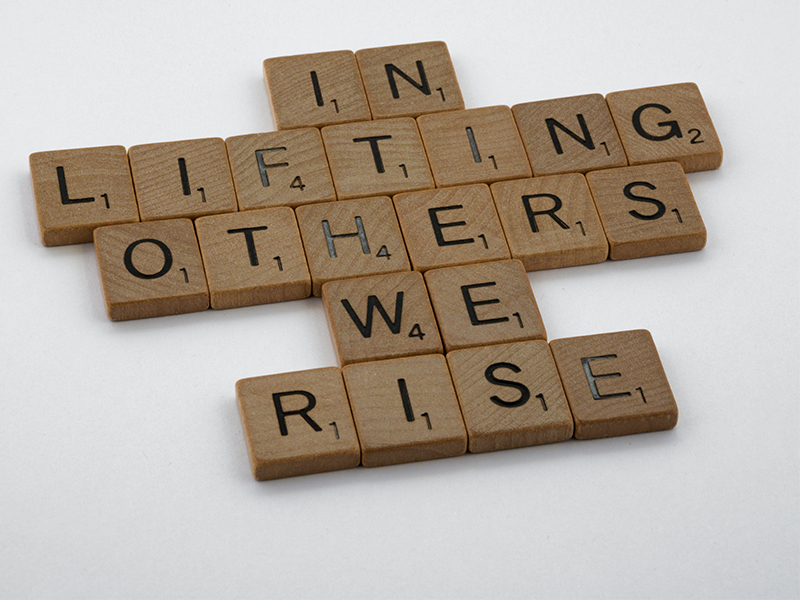July 4th every year is a celebration of the Declaration of Independence from England by representatives of the colonies that became the United States. It took the Revolutionary War to accomplish that goal, and the writing of the U.S. Constitution and Amendments (documents much in the news today). The document’s preamble:
We hold these truths to be self-evident, that all men are created equal, that they are endowed by their Creator with certain unalienable Rights, that among these are Life, Liberty and the pursuit of Happiness.
The National Archives describes the document:
The Declaration of Independence states the principles on which our government, and our identity as Americans, are based. Unlike the other founding documents, the Declaration of Independence is not legally binding, but it is powerful. Abraham Lincoln called it “a rebuke and a stumbling-block to tyranny and oppression.” It continues to inspire people around the world to fight for freedom and equality.

Statue of Niccolò Machiavelli, outside the Uffizi Gallery in Florence, Italy.
Niccolò Machievelli – A Guidebook for Arrogant Leaders
Born May 3, 1469 in Florence, Republic of Florence, Machievelli is most famous for his book The Prince. Controversial from the moment of publication the book is described as :
- a description of political realities
- a manual, teaching would-be tyrants how they should seize and maintain power
- a satire by an advocate of republicanism (he lived in a republic)
I believe the book is most likely a satire that political leaders instead used as a permission to do and be a ruler “guided exclusively by considerations of expediency, which uses all means, fair or foul, iron or poison, for achieving its ends – its end being the aggrandizement of one’s country or fatherland – but also using the fatherland in the service of the self-aggrandizement of the politician or statesman or one’s party.” (Strauss 1987, 297)
We know that Queen Elizabeth I kept a chained copy of The Prince by her bedside. The colonial explorations thrived in her reign. We know The Prince was taught, may be still, to political science students.
The result, regardless of intent, is generations of political leaders who rule by fear, creating enemies for their populations to hate (hate covers fear), believing “the end justifies the means.” And, those same attitudes are embedded in our corporations: profits at any price.
For this 4th of July let’s explore how our founding fathers viewed the man and his writings.
Founding Fathers and Machievelli’s point of view
George Washington was less influenced by Machiavelli than others. Benjamin Franklin, James Madison, and Thomas Jefferson “followed Machiavelli’s republicanism when they opposed what they saw as the emerging aristocracy that they feared Alexander Hamilton was creating with the Federalist Party.”
Alexander Hamilton learned from Machiavelli “about the importance of foreign policy for domestic policy, but may have broken from him regarding how rapacious a republic needed to be in order to survive.”
John Adams “commented on the Italian’s thought in his work, A Defence of the Constitutions of Government of the United States of America.
- Praises Machiavelli … as a philosophic defender of mixed government.
- Machiavelli restored empirical reason to politics
- Machiavelli’s analysis of factions was commendable.
- Agrees that human nature was immutable and driven by passions.
- Accepts Machiavelli’s belief that all societies were subject to cyclical periods of growth and decay.
The Machiavelli quote many of us are familiar with:
It ought to be remembered that there is nothing more difficult to take in hand, more perilous to conduct, or more uncertain in its success, than to take the lead in the introduction of a new order of things.
Because the innovator has for enemies all those who have done well under the old conditions, and lukewarm defenders in those who may do well under the new. This coolness arises partly from fear of the opponents, who have the laws on their side, and partly from the incredulity of men, who do not readily believe in new things until they have had a long experience of them.
These words have become the cement floor for the attitude of “Change is difficult.”

The Statue of Liberty, New York. “Give me your tired, your poor, your huddled masses yearning to breathe free.” “The New Colossus,” poem written by American Emma Lazarus in 1883.
The Pursuit of Happiness
Let’s revise Niccolò Machiavelli’s famous 16th century quote in The Prince.
“There is nothing more achievable to take in hand, more enjoyable to conduct,
or more certain in its success, than to join together to introduce a new order of being.”
What if the Constitution had been written around the Pursuit of Happiness?
What would our government goals be for the people?
- All people well-fed and housed
- Clean water and air, an unpolluted environment
- Well-educated society, and free university or skills training
- Funding for family farms and small businesses
- Creative arts funded and available
As I assembled this list I realized I was describing Denmark; I know this country because I have family members that live there. That led me to look up the happiest countries in the world:
Finland is the happiest country in the world, followed by other Nordic countries like Denmark, Norway, Iceland, and the Netherlands. Switzerland, Canada, Australia are in the top ten. New Zealand was in eighth place for the second year in a row. “What stands out about the happiest and most well-connected societies is their resilience and ability to deal with bad things,” said report co-editor John Helliwell, referencing New Zealand. The ten countries at the bottom are extremely poor and some suffer from arrogant leadership.
What if the Pursuit of Happiness didn’t stop at all the people, but all beings are given the right to live their lives happily in ocean, forest, prairie, desert, snow…?
What if we each took as our unalienable Right the pursuit of happiness? How would we live our individual lives?
How Easy It Might Be To Create A Happy World
On June 16 2023, I sent this letter to President Biden:
Dear Mr. President,
I read in Win Without War’s news that private negotiations were underway with Iran about uranium containment and other points. Congratulations on taking this approach. I regret that some among Congress, the Military, and the arms companies are now trying to stop this effort. I, my family, my neighbors except one, and my friends except three (I have enough friends it’s barely a statistical blip) are 100% behind diplomacy as a policy. The majority of us vote.
There is a war that needs to be fought – the war on the world climate we have created. Millions of people are affected by the challenge before us; millions of people are already working together to solve major issues. One year of the Pentagon budget spent on climate alternatives would reverse this destruction. Put the soldiers to work restoring forests, cleaning seas, bringing water to the deserts. Convert the military into a climate restoration machine. The need for wars for resources would be non-existent.
Of course, the weapons industries would lose profits, unless they converted their business model from defensive to climate offensive. When we did a study in the 1970s about shutting down the Rocky Flats nuclear trigger manufacturing plant in Boulder, CO, we discovered that only 2% of the employees would be required to retrain in their jobs… the weapons engineers. Everybody else could/would convert to making even band instruments as long as we paid the same salaries.
The same retraining point is true for the oil cartel, including our top producers. If they made the same profits cleaning up their messes, they could convert with a minimum of employee retraining.
Sincerely,
Lola Wilcox
It Takes Reframing
We would, for example,
- know our natural way in the world is to be happy
- refuse to believe in scarcity as a natural condition
- stop fulfilling our role as citizen consumer
- be aware of the context around any decision
- be able to assess risk and manage it
- be resilient – knowing failure is a part of experimentation
We would remove ourselves from a constant stream of bad news designed to generate fear and conflict. (How many friends – or you – have said, “I’ve stopped listening to the news and I am a lot happier.”)
Let the United States be about the Pursuit of Happiness.
On this 4th of July, let it begin with you and me.
Comments please!






Woo Hoo a stellar article. I’m enthralled with our body biome. If quadrillions if us can live well with each other, than certainly a few billion should be able to! Big hug! 🥰
Lola, I love your reframing list! Working on accepting the last one “failure is part of experimentation”. Letting go of perfection – ego driven.
I recently watched the movie THRIVE – what on Earth will it take? with Foster Gamble. I agree, we were born to be happy. There are certain influencers who perpetuate fear, scarcity, power over, and dumbing down our brains. We can CHOOSE a different path, guided by our thoughts and feelings. The PR campaigns and propaganda are pushy, but my inner knowing says we are ascending, expanding our consciousness. We are understanding the power our own minds have, and those thoughts are frequencies transmitting vibrations to creation. Love and thanks for posting these ideas on such an important day!
I have always had trouble celebrating July 4. All the flag waving and so-called patriotism left me feeling like a stranger is the country in which I was born. Your reframing of “the pursuit of happiness” as well as your letter to President Biden, gave me a new way to think about July 4. As a nation we’ve never achieved the lofty goals that the writers of the Declaration of Independence claimed they supported. Our constitution counted Black people as 3/5ths of a person, and secured rights for white males of property. Everyone else was left out. From the very beginning this country was founded on genocide and slavery. Now these stories are not allowed to be told in many parts of the country. So, I think it’s on each and every one of us who share the vision you so clearly spelled out, to share it, live it, and do what we can to make the dream of equality a reality.